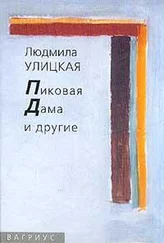
Table of Contents
Title Page
CHAPTER 1
CHAPTER 2
CHAPTER 3
CHAPTER 4
CHAPTER 5
CHAPTER 6
CHAPTER 7
CHAPTER 8
CHAPTER 9
CHAPTER 10
CHAPTER 11
CHAPTER 12
CHAPTER 13
CHAPTER 14
CHAPTER 15
CHAPTER 16
ALSO BY LUDMILA ULITSKAYA
EPILOGUE
Copyright Page


ALSO BY LUDMILA ULITSKAYA
The Funeral Party
CHAPTER 1
Medea Mendez had the maiden name of Sinoply and was, if we disqualify her younger sister Alexandra who moved to Moscow in the late 1920s, the last remaining pure-blooded Greek of a family settled since time immemorial on the Tauride coast, a land still mindful of its ties with Ancient Greece. She was also the last member of the family who could speak passably the medieval Pontic Greek which survived only in the Tauride colonies and lagged one thousand years behind modern Greek, the same length of time it was separated from the language of antiquity.
There had long been no one for her to talk to in this worn-out, resonant language from which the majority of philosophical and religious terms had sprung and which retained to this day a pristine literalness in words like metaphorisis , which meant “transportation.” The other Tauride Greeks of Medea’s generation had either died or been deported, but she had lived on in the Crimea by the grace of God, as she supposed, but partly no doubt also because of the Spanish surname bequeathed by her late husband, a jolly Jewish dentist with vices which were minor but not insignificant, and virtues which were great but meticulously concealed.
She was a widow for many years but didn’t remarry, ever the stereotypical figure in black, and the color suited her very well. For the first ten years she wore only black, then relented and allowed a scattering of white spots or small polka dots, but still on black. She wound a black shawl around her head in a way that was neither Russian nor rustic and fastened it with two knots, one of which hung to the right of her forehead. The long end of the shawl fell away in small classical folds to her shoulders and covered her wrinkled neck. Her eyes were brown, clear, and dry, and the dark skin of her face also fell in small dry folds. When she sat framed in the painted registration window of the Village’s little hospital wearing her back-fastening medical white coat, she looked like a portrait Goya had omitted to paint.
She entered notes in the hospital records in large, sweeping handwriting, and she stalked the land in these parts no less sweepingly. She thought nothing of rising before daybreak on a Sunday, putting the twenty kilometers to Theodosia behind her, standing through the liturgy, and walking back home toward evening.
For local people Medea Mendez had long been a part of the landscape. When she was not sitting on her stool in the white frame of the registration window, her dark figure was to be seen out on the eastern hills or on the rocky slopes to the west of the Village. She was not strolling idly but gathering sage, thyme, mountain mint, barberry, mushrooms, and rose hips, and she did not neglect the carnelian, the layered and structured rock crystal, or the dark antique coins with which the dull soil of this minor arena of world history was brimming.
She knew the region near and far like the inside of her own buffet, and not only remembered when and where a useful plant could be picked, but also noted to herself how the green mantle was gradually changing over the decades: the runners of mountain mint advancing down the spring flood channels on the eastern slope of Mount Kiyan; the barberry being killed by a canker which ate away its lower branches; the chicory attacking underground, its rhizomes stifling the delicate spring flowers.
The Crimea had always been generous in yielding up its treasures to Medea, and in return she appreciatively remembered every detail about every one of her finds: the time, the place, and all the nuances of feeling she had experienced, beginning with July 1, 1906, when as a little girl she had discovered, in the middle of the abandoned road to Ak-Mechet, a magic circle of nineteen identical-sized little mushrooms with pale green caps, the local variant of the white boletus. The most wonderful of all her nonedible finds was a flat gold ring with a lackluster aquamarine, cast at her feet by the sea as it was subsiding after a storm, on a little beach near Koktebel on August 20, 1916, her sixteenth birthday. She was still wearing that ring, which had become deeply embedded in her finger and hadn’t been taken off for some thirty years now.
She could feel the goodness of this land through the soles of her feet. It was in a poor state now, but she wouldn’t have changed it for anywhere else and had been outside the Crimea only twice in her life, for a total of six weeks.
Medea was born in Theodosia, or more precisely in a great rambling house, once well proportioned, in the Greek colony which had long ago been swallowed up by the outskirts of Theodosia. By the time of her birth the house had lost its original elegance, sprouting annexes, terraces, and verandahs to accommodate the rapid expansion of the family in the first decade of a century which had such a cheerful beginning.
The fast growth of the family was accompanied by the slow bankruptcy of her grandfather, Harlampy Sinoply, a wealthy merchant who owned four cargo ships registered to what was then the new port of Theodosia. In old age Harlampy lost his earlier driving and insatiable avarice, and looked on in wonder as fate, which had sorely tried him with many years of waiting for an heir, and visited on him six stillborn babies and innumerable miscarriages from both his wives, prodigally endowed his only son, Georgii (whom he had managed to produce only after thirty years of tribulation), with progeny. Georgii’s fruitfulness might, however, have been the merit of Harlampy’s second wife, Antonida, who walked in pilgrimage to Kiev in fulfilment of a vow and, having given birth to and weaned her son, fasted in thanksgiving for the rest of her life. Or perhaps his son’s fecundity came from the scrawny redheaded bride, Matilda, whom he had brought from Batumi and who entered the house already scandalously with child and thereafter gave birth to a round-headed baby once every two years, in late summer, with unfathomable but cosmic regularity.
As the number of his grandchildren increased, old Harlampy declined, growing kindlier until by the end of his life he had lost along with his wealth even the appearance of a hard, authoritarian, and shrewd merchant. His blood proved strong, however, not yielding to other lines, and those of his posterity who were not winnowed by the bloodthirsty times inherited robustness of spirit and talent from him, while his renowned avarice manifested itself in his male issue in great energy and a passion for building. In the women, as in Medea, it turned into thrift, a heightened interest in material things, and a practical resourcefulness.
Harlampy’s family was blessed with so many members it might have provided an admirable subject for a research project into the distribution of hereditary characteristics. No suitably motivated geneticist appeared, but Medea with her characteristic urge to bring system and order to everything, from the teacups on the table to the clouds in the sky, did more than once in her life, for fun, rank her brothers and sisters in order of the gingerishness of their hair—in her mind’s eye, necessarily, since she could not remember the entire family gathered together in one place at any one time. One or another of the elder brothers was invariably absent. Their mother’s coppery hair was passed on to some extent to all of them, but only Medea herself and the youngest of her brothers, Dimitry, were radically redheaded. Alexandra’s hair was a complex mahogany hue, and even had the highlights of mahogany.
Читать дальше







![Людмила Улицкая - Сквозная линия [litres]](/books/393468/lyudmila-ulickaya-skvoznaya-liniya-litres-thumb.webp)





